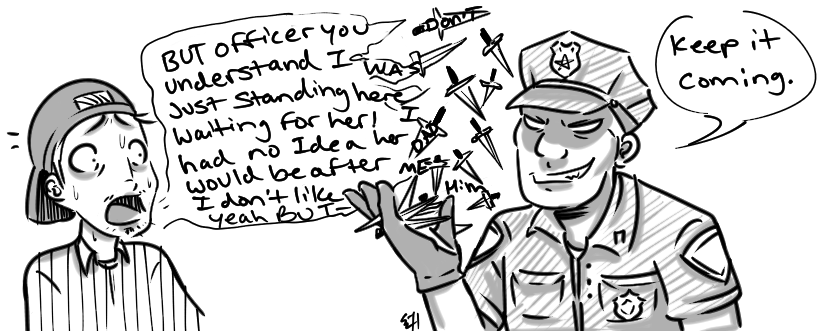For thirty years, Henry Lee McCollum and Leon Brown sat in a North Carolina prison for a rape and murder they didn’t commit. There was no physical evidence linking them to the crime, so McCollum’s and Brown’s convictions rested heavily on coerced confessions given under the false belief that if they “talked,” they would be able to go home. They finally got to do just that, after a fresh look at DNA evidence led to the exoneration of both men.
McCollum and Brown might have avoided spending the majority of their adult years incarcerated if someone had given them one piece of advice: Never talk to the police.
“Any lawyer worth his salt will tell the suspect in no uncertain terms to make no statement to police under any circumstances,” wrote Supreme Court Justice Robert Jackson, a former United States Attorney General and chief prosecutor at the Nuremberg trials.
Even with such credentials, Jackson realized the importance of the Fifth Amendment’s protection against self-incrimination.
The necessity of this protection shows up, too, in the Supreme Court in Miranda v. Arizona, resulting in the requirement of the “Miranda warning.” If you’ve ever watched an episode of Law & Order, chances are you’ve heard it: “You have the right to remain silent. Anything you say can and will be used against you in a court of law,” and so on. The Court saw Fifth Amendment rights as so vital they thought it necessary that suspects are informed of their rights before any interrogation takes place. While Miranda law applies only after arrest, your right to remain silent exists even if you haven’t been arrested.
If police stop you, an officer may ask if you know why you are being stopped or where you’ve been and where you’re going. Though these types of questions might seem harmless, they are only asked as a way to gather additional evidence against you. When an officer pulls you over for speeding and asks, “Do you know how fast you were going?” it’s not because he’s checking the accuracy of his radar gun. The question is designed to elicit an admission of guilt. Even if you answer that you were only going a couple miles an hour over the limit, you’re admitting that you broke the law, and that statement can and will be used against you.
You have no obligation to give an officer any information or answer any questions beyond providing your license if stopped while driving a vehicle (and in some states, you are required to give ID even if you’re not driving). Not only are you not required to answer questions, in no way does answering help you. According to law professor at Regent University School of Law and Fifth Amendment expert James Duane, not only can statements made to the police be used against you, they cannot be used in your defense.
But what if you’re innocent? If you have nothing to hide, what’s the harm in talking to the police? McCollum and Brown were innocent, yet their statements to police sent them to prison for three decades. McCollum and Brown falsely confessed, but a confession is not necessary for statements to land you in jail.
A “white lie,” or even a misstatement, can be used to destroy your credibility. Even if you’re completely honest and don’t misspeak, you could give investigators information that can be used to convict you. Say that, during questioning, you deny any involvement, but you mention that you “never liked the victim.” As Duane points out, you’ve just provided a motive. And even if you tell the truth, don’t make any mistakes or give the police any details that might help their case against you, if an officer does not recall your statement accurately, his mistake might lead to a conviction. When it’s an officer’s word against yours, it’s almost certain whom a judge or jury will believe.
It’s tempting to believe that you should cooperate with the police, especially if you are innocent. As Supreme Court Associate Justice Felix Frankfurter pointed out, “[Many] … view [the protection against self-incrimination] as a shelter for wrongdoers.”
However, as Frankfurter continued, “The privilege against self-incrimination serves as a protection to the innocent, as well as to the guilty.”
As a citizen, it is incumbent upon you to know and assert your rights. In any police encounter, the only thing you should say is, “I respectfully decline to answer any questions.” If only Henry Lee McCollum and Leon Brown had been offered such advice.











